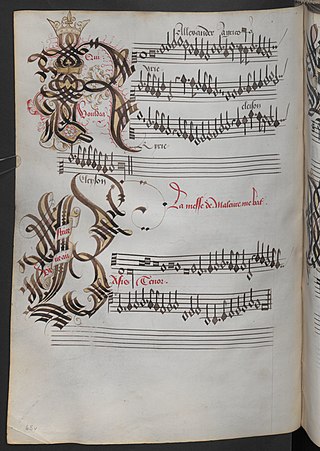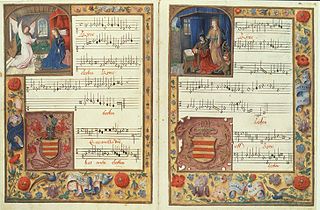
Josquin Lebloitte dit des Prez was a composer of High Renaissance music, who is variously described as French or Franco-Flemish. Considered one of the greatest composers of the Renaissance, he was a central figure of the Franco-Flemish School and had a profound influence on the music of 16th-century Europe. Building on the work of his predecessors Guillaume Du Fay and Johannes Ockeghem, he developed a complex style of expressive—and often imitative—movement between independent voices (polyphony) which informs much of his work. He further emphasized the relationship between text and music, and departed from the early Renaissance tendency towards lengthy melismatic lines on a single syllable, preferring to use shorter, repeated motifs between voices. Josquin was a singer, and his compositions are mainly vocal. They include masses, motets and secular chansons.

Heinrich Isaac was a Netherlandish composer of south Netherlandish origin during the Renaissance era. He wrote masses, motets, songs, and instrumental music. A significant contemporary of Josquin des Prez, Isaac influenced the development of music in Germany. Several variants exist of his name: Ysaac, Ysaak, Henricus, Arrigo d'Ugo, and Arrigo il Tedesco among them.

Johannes Ockeghem was a Franco-Flemish composer and singer of early Renaissance music. Ockeghem was a significant European composer in the period between Guillaume Du Fay and Josquin des Prez, and he was—with his colleague Antoine Busnois—a prominent European composer in the second half of the 15th century. He was an important proponent of the early Franco-Flemish School.

John Taverner was an English composer and organist, regarded as one of the most important English composers of his era. He is best-known for Missa Gloria tibi Trinitas and The Western Wynde Mass, and Missa Corona Spinea is also often viewed as a masterwork.
Antoine Brumel was a French composer. He was one of the first renowned French members of the Franco-Flemish school of the Renaissance, and, after Josquin des Prez, was one of the most influential composers of his generation.

Jehan le Taintenier or Jean Teinturier was a Renaissance music theorist and composer from the Low Countries. Up to his time, he is perhaps the most significant European writer on music since Guido of Arezzo.

Jacob Obrecht was a Flemish composer of masses, motets and songs. He was the most famous composer of masses in Europe of the late 15th century and was only eclipsed after his death by Josquin des Prez.

Alexander Agricola was a Netherlandish composer of the Renaissance writing in the Franco-Flemish style. A prominent member of the Grande chapelle, the Habsburg musical establishment, he was a renowned composer in the years around 1500, and his music was widely distributed throughout Europe. He composed music in all of the important sacred and secular styles of the time.

Pierre de la Rue was a Franco-Flemish composer and singer of the Renaissance. His name also appears as Piersson or variants of Pierchon and his toponymic, when present, as various forms of de Platea, de Robore, or de Vico. A member of the same generation as Josquin des Prez, and a long associate of the Habsburg-Burgundian musical chapel, he ranks with Agricola, Brumel, Compère, Isaac, Obrecht, and Weerbeke as one of the most famous and influential composers in the Netherlands polyphonic style in the decades around 1500.

Loyset Compère was a Franco-Flemish composer of the Renaissance. Of the same generation as Josquin des Prez, he was one of the most significant composers of motets and chansons of that era, and one of the first musicians to bring the light Italianate Renaissance style to France.
Walter Frye was an English composer of the early Renaissance.
Pierre Moulu was a Franco-Flemish composer of the Renaissance who was active in France, probably in Paris.
Johannes Martini was a Franco-Flemish composer of the Renaissance.

The Chigi codex is a music manuscript originating in Flanders. According to Herbert Kellman, it was created sometime between 1498 and 1503, probably at the behest of Philip I of Castile. It is currently housed in the Vatican Library under the call number Chigiana, C. VIII. 234.
Johannes Regis was a Netherlandish composer of the Renaissance. He was a well-known composer at the close of the 15th century, was a principal contributor to the Chigi Codex, and was secretary to Guillaume Dufay.
Jean L'Héritier was a French composer of the Renaissance. He was mainly famous as a composer of motets, and is representative of the generation of composers active in the early to middle 16th century who anticipated the style of Palestrina.
Marbrianus de Orto was a Dutch composer of the Renaissance. He was a contemporary, close associate, and possible friend of Josquin des Prez, and was one of the first composers to write a completely canonic setting of the Ordinary of the Mass.
The first decade of the 16th century marked the creation of some significant compositions. These were to become some of the most famous compositions of the century.
Jehan Fresneau was a French composer of the Renaissance. He was one of the composers in the renowned Milan chapel in the mid-1470s, which was disbanded after the assassination of Duke Galeazzo Maria Sforza.

Jheronimus de Clibano was a Franco-Flemish composer and singer of the Renaissance. He was a member of the Habsburg Grande chapelle, the distinguished choir of Philip I of Castile, at the same time as Pierre de La Rue.











